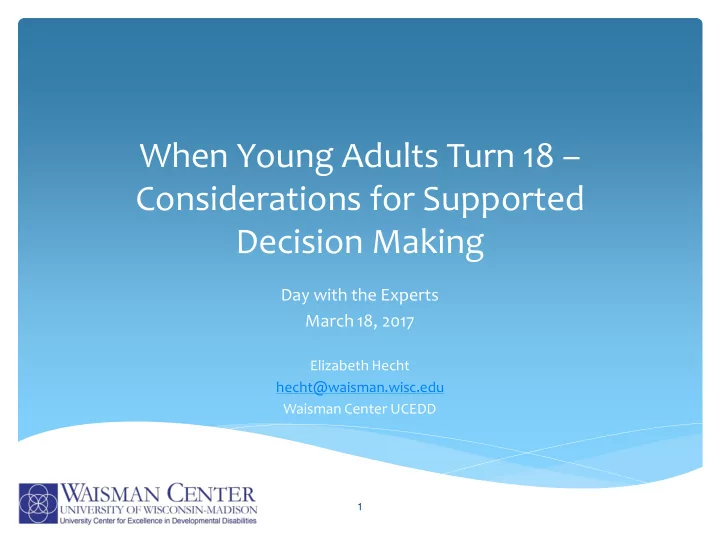

When Young Adults Turn 18 – Considerations for Supported Decision Making Day with the Experts March 18, 2017 Elizabeth Hecht hecht@waisman.wisc.edu Waisman Center UCEDD 1
CYSHCN Regional Centers http://www.dhs.wisconsin.gov/health/children/resourcecenters/index.htm 2
What Happens at Age 18? ∗ Any person in Wisconsin over the age of 18 is legally an adult, and is presumed to be able to manage his or her own financial affairs, choose where to live, consent to medical treatment, vote, make contracts, marry, and exercise his or her own legal rights as an adult. This presumption does not change because a person has a disability. ∗ When a person is unable to do some or all of these, some form of supported decision making is needed. 3
Making Decisions is a Learned Skill ∗ Families do the best they can to raise & support their children based on: ∗ Strengths and resources ∗ Cultural beliefs and values ∗ History and experience ∗ Typical families and children have access to everyday experiences that prepare them for self- determined lives ∗ Children with disabilities have fewer opportunities to have self advocacy experiences ∗ Families who have children with disabilities may need help teaching decision-making skills ∗ Families and youth need information and experiential opportunities to develop these skills Experience and Questions Booklet 4
Families Need Information ∗ Start a conversation well in advance ∗ Ask if the family has thought about the need for decision making supports ∗ Share information ∗ Family Voices Fact Sheet ∗ Regional CYSHCN Center brochure ∗ Connect families and youth to learning opportunities ∗ Explore decision-making skills and skill-building opportunities 5
Legal Tools to Support Decision-Making ∗ Release of information/consent ∗ Power of Attorney for healthcare, finances or education ∗ Limited Guardianship or Full Guardianship of the person and/or estate 6
The number of adults under guardianship has tripled since 1995 with ~ 90% being full guardianship. Jameson et al. "Guardianship and the Potential of Supported Decision Making with Individuals with Disabilities." Research and Practice for Persons with Severe Disabilities , 2015, online ahead of print 7
8
What is Supported Decision-Making? ∗ “An emerging approach to providing decision-making assistance …without imposing any long-term legal limitations on rights or personal liberties” (Campanella, 2015) ∗ “an alternative to guardianship through which people use friends, family members and professionals to help them understand situations and choices they face, so they may make their own decisions without the “need” for guardianship.” (Blanck & Martinis, 2015) 9
We All Make Decisions How do you make decisions? Who do you go to for help? Have you ever made a bad decision? What did you learn? Life Course Tools 10
Citizenship and Guardianship ∗ The rights to liberty (freedom to control our own lives), to the pursuit of happiness (choosing and seeking to reach our own goals in life), and to control our own property are central to our idea of what it means to be an adult citizen of the United States. ∗ Guardianship restricts those rights, and labels the person as someone who does not have the full rights of other adults. 11
Guardianship Guardianship is a legal process where a court decides if: ∗ A person lacks “capacity” to make decisions for themselves AND ∗ There are no less-restrictive alternatives than guardianship ∗ It may be temporary or permanent ∗ Guardian of the person: when the guardian has custody and control of decisions made for the “ward” ∗ Guardian of the estate: when the guardian is responsible for managing the “wards” money and property 12
Guardianship-Standard for Incompetence “A central issue for the court is the impact of the impairment on the person’s functional ability to make decisions that are important to his or her health and safety. Guardianship is based not on the quality of the decisions the person makes, but on the process by which he or she makes and communicates the decision.” ∗ Need for typical experiences ∗ Growth and development ∗ Self-advocacy skills 13
Positive Consequences Of Guardianship ∗ • Making decisions the person is unable to make for himself or herself, and giving consent the person is not able to give ∗ • Exercising rights on behalf of the adult that the adult is unable to exercise for himself or herself ∗ • Acting as an advocate for the adult's best interests ∗ • Taking action to protect the adult from abuse, neglect, self-neglect, financial exploitation and violation of rights 14
Negative Consequences Of Guardianship ∗ Determination of “incompetent” can be a painful process, emphasizing the person’s incapacity, rather than strengths. ∗ The person may feel labeled as a second-class citizen and a loss of dignity and respect ∗ Other people may assume that the person is incapable or incapacitated ∗ The right to take risks is an opportunity to learn and grow. 15
Negative Consequences Of Guardianship ∗ A person who is unaware of his or her basic rights and of how to assert them, is at greater risk of abuse and exploitation by others. ∗ If we want the person to be able to say “no” to others, we must accept the inconvenient fact that they will sometimes say “no” to us. ∗ A person who is used to having decisions made by someone else can lose self-confidence and see themselves as incapable of developing decision- making skills. 16
Resources ∗ Family Voices of WI - FACT SHEET: Supported Decision Making for Transition Age Youth ∗ National Resource Center for Supported Decision Making ∗ Got Transition-Guardianship and Alternatives for Decision Making Support ∗ Wisconsin Guardianship Support Center ∗ WI DHS Advance Directives Forms ∗ Community of Practice on Supporting Families 17
Recommend
More recommend